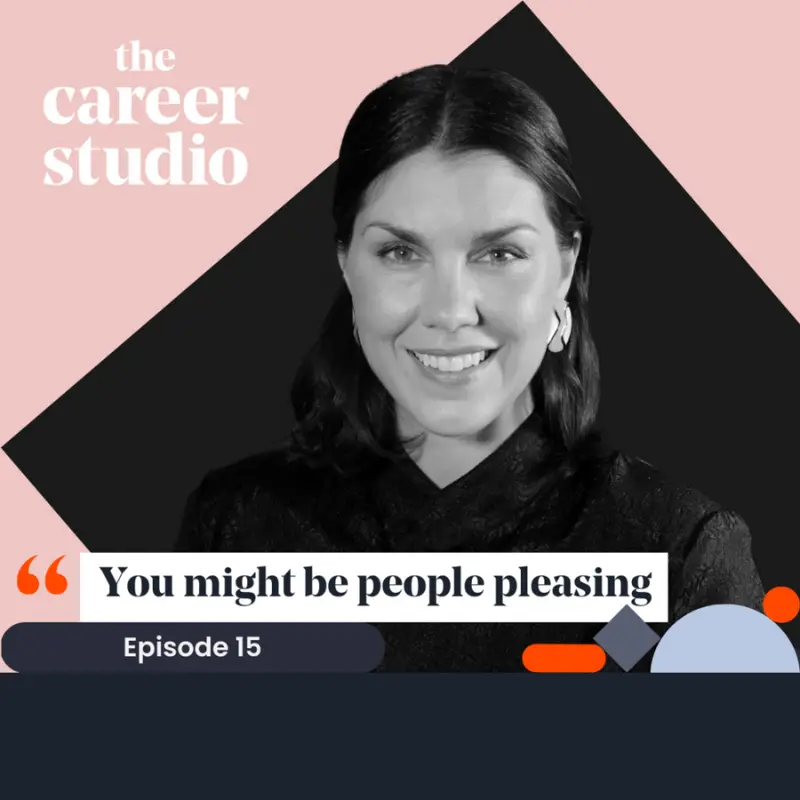You might be people pleasing

Most people pleasers don’t realize they’re people pleasers. Because people pleasing is more nuanced than telling people yes when you really mean no. In fact, it’s a way of operating that can actually get you quite far professionally - that is, until you burnout or reach a level of screaming discontentment because you realize the environment you’re in does not fit with the person that you are.
If you consider yourself a high-achiever and you’re also struggling with burnout or feeling lost professionally, let me offer that you might be people pleasing.
In this episode I cover.
- The people pleasing qualities that make you successful
- The flip side of the success people pleasing creates
- The origins of your people pleasing
- How people pleasing gets in the way of professional and personal alignment
- How to begin to unwind from people pleasing tendencies
Related episode
Are you ready to create an energizing career you love?
You can create a career that is simply an extension of who you are and how you want to live your life. If this sounds like what you’re after then schedule a consultation. We'll get to the bottom of what's going on for you. And exactly where you need to focus to bring your career and life into alignment. It's free!
For more from The Career Studio
Transcript
Welcome to the career studio podcast, where we boil down the noise and focus on the core concepts, essential for building an energizing career you love. One that is simply an extension of who you are and how you wanna live your life. Anyone can do it. It's just a matter of knowing what to focus on.
Hi guys. Welcome. I can't believe this is the 15th episode . My producer told me most podcasts stop around 10. So I'm considering this. I'm celebrating this, let's say, and yeah, they keep getting easier and I'm having more fun doing them. So there is gonna be more. And if you're liking them, that's a good thing. Okay, so today I wanted to talk about people pleasing, and this is a topic near and dear to my heart as I consider myself a recovering people pleaser.
And I consider this one of the biggest hurdles, one of the most toxic culprits that gets in the way of creating an energizing career that you love. And I'll say here that a lot of people don't self-identify as people pleasers. It's kind of one of those things where either people are in denial or they genuinely think they're not people pleasing. And I would've considered myself in that category for sure.
So let me say here that it's not always about just agreeing with whoever is in front of you or saying yes when you mean no or apologizing all the time. There are other ways people pleasing shows up. And if you feel lost or burned out, I wanna offer that you might be people pleasing in one of the kind of more subtle ways that I'm gonna talk about today. And you know, the reason I really love this topic is not only because it's such a personal experience, such a personal mountain that I've climbed, but it's because people pleasing is really sneaky because the patterns, the behaviors that people pleasing creates can get you far.
People pleasers are typically highly intuitive. They are great at reading a room. They have a really strong work ethic, willing to put in the hours, you know, wanna do a good job. They're very good at integrating with a variety of people, relating to other people, building relationships quickly. These are all qualities that people pleasers tend to demonstrate.
But then ask yourself if you relate to some of those or all of them, ask yourself, are you also buried under a never ending to-do list that you feel very beholden to, right? You feel like you can never get on top of your to-do list? Do you feel like everyone wants you all the time? You have no time for yourself, and you really struggle to create that time for yourself, or you really struggle to push back on work and say, no, I can't do this, or I'm not gonna respond to emails at this time, or I can't take on that extra project.
Do you find yourself apologizing for things that maybe you don't have control over? Or do you find yourself often worrying that other people might get mad at you or think badly of you if you say certain things? Right. Are you kind of the the type of person who is more likely to just agree or just keep silent? To keep the peace than to voice your opinion.
Of course, there's nuance to everything that I'm saying, but if you said yes to a few of the things in both the strengths or the first part of what I presented, as well as the second group that I just presented, then I wanna offer that you have people pleasing tendencies.
Okay? This combination of those strengths and those challenges, people pleasing. Okay. If a client came to me and was showing me those combinations, this is something, this is an area that I would focus on. Okay? So if it's you, you're in the right place. We're gonna talk about it. Don't worry. Lots of high achievers are people pleasers because as I said, the qualities that can make you successful also have kind of a darker side.
Okay, so, and where, where did it come from? Let's talk about people pleasing. A little bit of background. Usually this is formed in childhood and something happened while you were growing up where you started to behave or to earn love by adapting yourself to the needs and standards of others. Okay? Now, it could be that you had a parent or a significant figure that was inconsistent or conditional in how they showed their love. And so what you did is you learned to adapt yourself to a certain way of being that allowed you to more reliably receive their love. Okay? Or that might not resonate with you, but just maybe at some point when you were young, you had some sort of experience or combination of experiences that led you to make an assumption that you needed to be a certain way in order to be worthy of love, okay? We don't always have to blame our parents, but those two scenarios will basically cover it. In short, it's basically you developed a pattern of adapting yourself or doing more in order to be worthy or worthy of love. Okay? So it doesn't really matter where it came from.
The issue is now. And this is what separates me from a therapist. The therapist will go back and, and look at why and what happened, and I'm more concerned about, okay, let's solve this now. What are the problems at play now.The issue is that this people pleasing tendency is now playing out in your career. And right for a while, as I mentioned before, it's been a roaring success, right? Because your strong work ethic, your ability to adapt to other people's needs, this has allowed you to excel quickly. You've seen these as strengths, which they absolutely are, but, if you are also burning out or feel totally lost, it's because that same thing that's made you successful has reached a tipping point.
The patterns of behavior that we adopt at some point, they're no longer useful as we grow, or our environment changes, right? So we have to learn how to evolve. So if you're burning out or if you feel super lost professionally, your people pleasing has reached a tipping point. Let me explain in more detail what people pleasing can impact.
Okay? So first, it can really impact how we think about what we do. Right, in terms of the field we're in or the function that we're in. When we are used to adapting ourselves to the needs and standards of other people, it means that what we've selected for our career path may have been selected, not from a place of authenticity, but from a place of what we think we should be doing.
So we saw a pattern outside of ourselves, right in our social circles, in our family, in our education system, that if we had a people pleasing tendency, we thought, oh, that's what I need to do to be successful. I'm gonna adapt myself to that professional field because that is what will make me worthy. So this might be the case for you that you are unhappy professionally because you've realized enough time has passed, and even though you've been successful, you've realized, wait, I'm not actually interested in this work.
Right? It's worked for a while. I've been successful, but I'm looking around and I'm realizing, gosh, I'm not actually interested in what I do. Or for whatever reason, it doesn't fit who you are. Okay. The other thing people pleasing can impact is how much you work, right? And so this can contribute to burnout. So when you're a people pleaser, it'll be very uncomfortable to say no to extra work or to say no, to request to work during your personal time, or it can impact your ability to ask for help.
Because we're worried, because people pleasers often believe they have to do more or be more in order to be worthy. Or they worry they have to mold themselves to the work standards of other people, right? So this is about doing more, saying yes to what other people need instead of paying attention to what you need. Okay? This is just a lack of boundaries, right? So if you really struggle with boundaries, this is often a people pleasing tendency.
The third big area. So first was, kind of the field that you're in. The second thing that can impact is kind of how much you work and your ability to set boundaries and, and the third area people pleasing impacts is your confidence in yourself.
Right? A reticent to voice your genuine opinion. Because you are worried what other people will think of you or that you will be judged for not agreeing, right? Or that other people will not love you, right? Or in the professional context, not want to work with you if you disagree. This can also show up as crippling perfectionism, right?
Having to read an email, tons and tons of times are taking ages to execute something. Always striving for A plus work for worthiness as it has to be perfect, right? I'm not allowed to make a mistake. I have to do more in order to be successful. So these kinds of patterns, not voicing your opinion, worrying what other people think, really focusing on perfectionism, trying to control also, trying to control everything.
This creates low self-esteem and it also creates this kind of unending quest for achievement. These are the negative impacts of people pleasing. And the reality is that eventually, all the hard work, all the adapting, it gets exhausting, right? And this is why you burn out. And this is when you realize, wait, why am I doing this thing?
I don't actually even like it. What am I doing it for? There's other ways that people pleasing can show up. Let me just give a few examples of things I've experienced from working with my clients. Other patterns, other impacts of people pleasing. So when you're preparing for a networking conversation, some sort of informational conversation with another person, a people pleaser will spend more time focused on trying to look good for that other person.
Trying to appear a certain way rather than actually getting to the heart of what they're trying to figure out and learn as part of that conversation, right? When we are so concerned about what other people think, we miss out on asking our genuine questions and fears and concerns that we are trying to solve as part of a conversation that's kind of investigating, let's say a career idea or asking that person questions about how to navigate whatever it is that you're challenged with.
Okay, so the people pleaser will be focused on how they appear rather than what they actually need to know. Another way it shows up is, let's say you begin an interview process. The people pleaser or people pleasing tendencies will be more focused on getting the interviewer to like you, right? Adapting your answers so that they like you and wanna hire you, rather than actually asking yourself, do I like this role? Is this role the right fit for me? Are these people the right fit for me? Of course you wanna present yourself well when you're interviewing, but equally, you have to remember, this is just as much me interviewing them as it is them interviewing me.
And if you're stuck in a pattern of people pleasing, your tendency is going to be to want to impress and want to say yes and want to adapt to what they need. And then what would happen is you find yourself in a role that's actually not a good fit for you because you were just focused on adapting to what they needed.
Rather than saying, is this what I want? So this is, this is the whole pattern. Ultimately, the people pleaser is so used to creating success by measuring up to other people's needs and standards that they haven't developed their own internal compass, right? And they haven't learned to love tuning into it, right?
What matters to me? Who am I? What do I value? How does this fit for that? How does this person make me feel? How does this project make me? People pleasers are often lost because they don't really know who they are, or they know a little bit, but they aren't really owning it just because that's not how they're used to operating, right?
They're used to their priorities and their needs, taking a backseat to the needs and standards of other people. Okay, so, I've kind of gone off in a few different directions. I hope this has mostly made sense, but I wanna finish by discussing if this all resonates for you. If, if you heard a lot of your patterns and what I just presented, here's how to fix it, right? Here's what to start doing, to start to unwind from the people pleasing tendencies. First, you wanna start tuning into yourself. You wanna start really knowing yourself and owning that, right? I think this, for me, this was a big one. I wanted to be, you know, the person that was really quantitative or really like business strategic.
You know what? I have other strengths that I now use in my coaching that aren't those, right? But I had to accept that. So here's some questions to start tuning into yourself. What parts of life come easily to you that don't really feel like work. What topics genuinely interest your brain? What do you like thinking about?
What are your priorities for your life? Right? Where do you wanna live? What kind of people do you wanna work with? What kind of money do you wanna make? What really matters to you in terms of values? How you work, the types of people that you hang out with and work with. What values do they have? More tactically things like what do you need to maintain your mental health, your physical health.
Having answers to these questions starts to give you clarity around who you are and what matters to you. This is what I do with my clients very intentionally as part of our work. But anyone can start thinking about this stuff. Second thing to do, besides after your, you've answered some of those questions, really started tuning into yourself.
Practice saying no. And I promise you it's gonna feel hard at first. I know, I know. It feels hard. So start small. Start with one thing that you think would make the biggest difference. Like maybe not working on weekends or not working in the evening, not replying to emails during a certain time. You could just start having a conversation with your boss around your to-do list and what's actually a priority.
So you're not even saying no, you're just starting to lay the groundwork to be able to say no. This could be also outside of a work context. It could be saying no to your kids or your partner or your parents about something they need from you. It could be, no, not right now, but in five minutes, right? Just practice using the word no.
Next I think practice being honest. Right. Really be honest about how you're feeling, what you know, what you don't know. Honesty is really powerful and it is so much easier than telling a lie, even if it's a white lie or even if it's, um, you know, not a big thing to not tell the truth. Be honest. The more you can be honest, the more you're tapping into yourself about what's genuinely going on for you.
You know, when someone asks at the start of a zoom call, how are you feeling? Or how are you doing? Instead of just saying good, answer that genuinely, give them an emotion for how you're genuinely feeling, right? This authenticity, being yourself. It's all honesty, you know? And last I'd say, and this is maybe me just giving you a pep talk, but remember, you're, you're worthy exactly as you are.
No matter what you learned in childhood, you do not need to be different or do more in order to be worthy of love. It sounds super cheesy, but you are perfect exactly as you are. You do not need to change anything, and you can't control if people like you. Even if they act like they like you, you never are gonna know what's actually going on inside their head.
You will never have any true idea of how they feel and trying to control how they feel about you, disconnects you from you, cuz you're so busy adapting yourself to how you think you need to be for other people. You lose the connection to yourself, which means you lose the connection to your intuition and your gut and knowing where you're going and what matters to you.
Right? Someone said to me, I forget where I picked this up, but I love it. You can be the juiciest peach on the tree, and there's still gonna be people who don't like peaches. I love this expression cuz I love peaches and I think it's really true. Not everyone's gonna like you. So practice focusing on what you can control.
Since you can't control what other people think and feel about you, what you can control is you, you can control how you think and how you show up, you know, is how you show up in alignment with the person that you want to be. Okay. So to recap how to fix it, start asking yourself what you actually like and what your priorities and values are.
Practice saying no, it can be infinitesimal. Just practice using the word no. Practice being honest, really telling people how you're feeling, what's going on for you, what you know, what you don't know. And just remember, you can't control what other people think and feel, but you can control how you show up and what you choose to think.
And so focus on that instead. Because it all comes back to the core concept of my business, which is it takes less energy to be yourself. The reason people pleasing is such a career fulfillment killer is because when you operate from people pleasing tendencies, you are not being yourself. The less you people please, the more you'll tap into who you are, what feels good, and what matters to you,
And this, this will give you the guardrails to direct your career. Which is now gonna feel more energizing because you just have to show up every day and be yourself instead of adapting to something else. And so when you can show up and be yourself every day, this is how you thrive, and this is how you create the most impact while you're here on the planet.
All right. That's my spiel for the day. This is a huge topic, I'm sure I'll talk more about it at some point, but yeah, it takes less energy to be yourself. Have a good one.
Hey, if you're ready to create an energizing career you love, one that is simply an extension of who you are and how you want to live your life. Then I wanna invite you to schedule a consultation. We'll get to the bottom of what's going on for you. And exactly where you need to focus to bring your career and life into alignment. It's free. Just head on over to thecareer.studio/schedule to find a time that works for you, or if you're enjoying and getting value from these episodes, I'd love you to leave a short review on whatever podcast app you use.
This helps other people like you find and get value from the podcast too.



